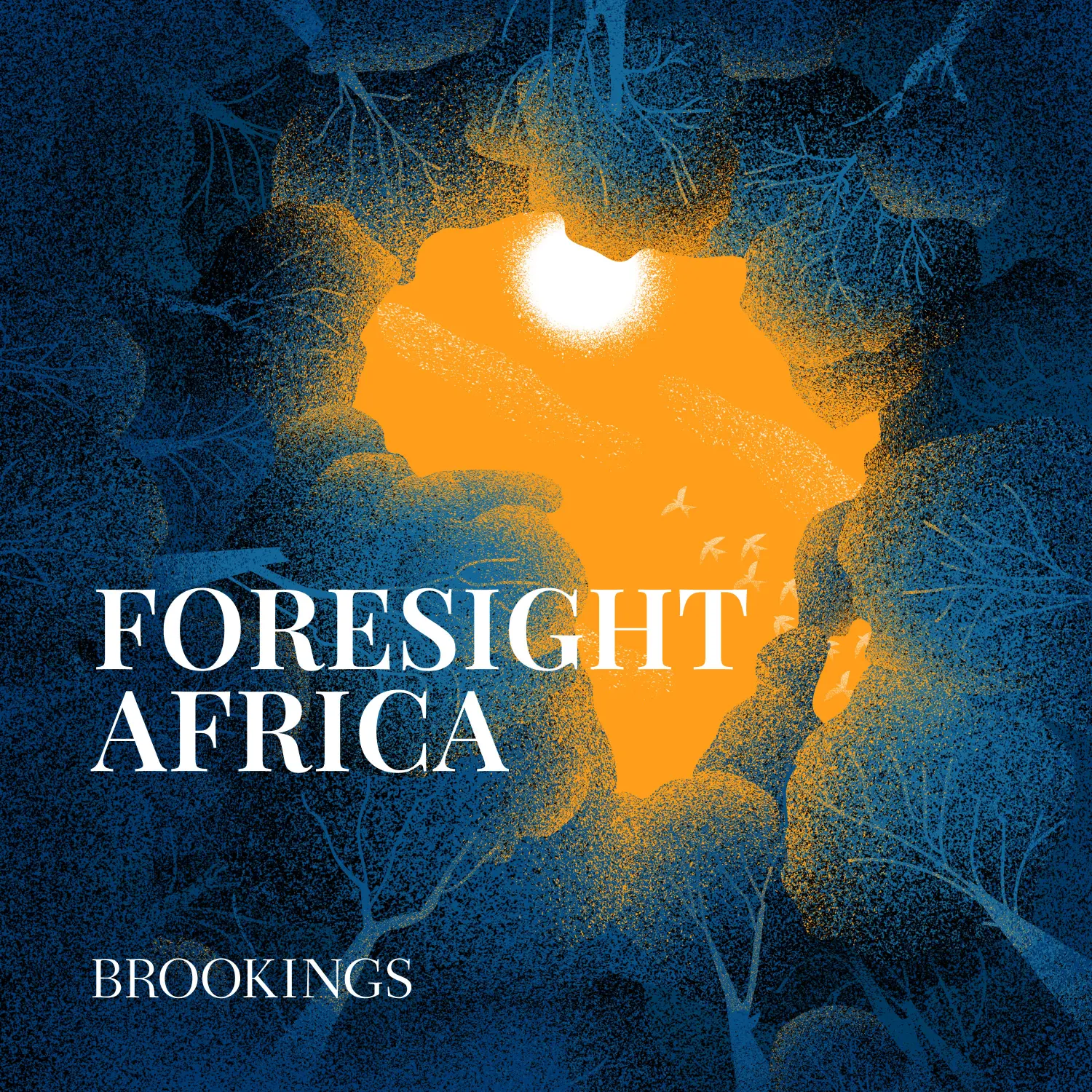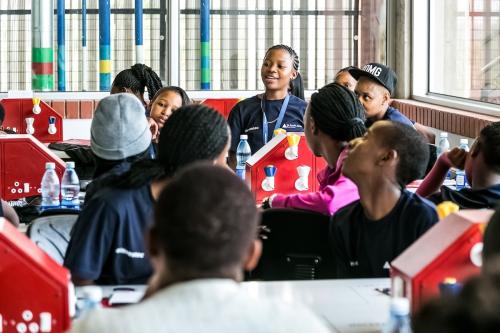This audio recording is part of the UNGA 2025 special episode of the Foresight Africa podcast. Listen to the second episode of the three-part series, which includes interviews with three other speakers on site at the event.
Landry Signé, senior fellow in the Global Economy and Development program and the Africa Growth Initiative at the Brookings Institution and host of the Foresight Africa Podcast, attended the U.N. General Assembly in September to speak with some of organization’s top leaders and international partners on the U.N.’s successes and future in a changing world.
In this interview, Landry Signé speaks with Kibonen Nfi, founder and creative director of the fashion brand Kibonen. Blending West African fabrics, Cameroonian tradition and New York style, Kibonen designs have been featured in stores, magazines and runways around the world.
Transcript
LANDRY SIGNÉ: So before we begin, could you please state your full name and title for the recording?
KIBONEN NFI: My name is Kibonen Nfi. I’m a fashion designer creative director for Kibonen.
LANDRY SIGNÉ: I am delighted to have you join me during the 80th UN General assembly, and I truly appreciate you taking the time to share your insights with our audience. I know everyone wanted to engage with you.
KIBONEN NFI: I know.
LANDRY SIGNÉ: What are your top priorities for the 80th session of the UN General Assembly and how do you see this shaping the global agenda moving forward?
KIBONEN NFI: So, the top priority for us is to position fashion as a driver for economic growth, youth empowerment, youth education, and also for, sustainability, like the environmental agenda for the U.N.
So being here and having conversations with policymakers industry leaders is definitely key because this is where ideas are shared, initiatives are taken, exchanges are done, and we are able to look at things holistically in how fashion can be positioned not just for the aesthetics of it, but for what it contributes to the development of a people, and of a nation, and of the continent as a whole.
LANDRY SIGNÉ: Amazing. And what makes UNGA uniquely valuable forum for advancing these priorities and eventually strengthening multilateral engagement?
KIBONEN NFI: So the UNGA is uniquely valuable because it brings together governments, private sector and civil society, in a space to advance solutions for all of these things that are pending. You know, for Kibonen, the UNGA offers visibility and dialogue, with policy makers who influence the trade policies, also financing and cultural exchanges. It also provides a platform for African fashion to be positioned as an industry and also as a strategic contributor to the global economy and also sustainability development and cultural diplomacy.
Cultural diplomacy for me is very key because that is the softest way you can, transmit, translate ideas and solutions to problems that we have.
LANDRY SIGNÉ: I really love how you are emphasizing the critical importance of creative industries in strengthening multilateral engagement.
In what ways have today’s global challenges reshaped your organization’s, or I would even say your industry in general’s, approach to multilateral governance and global multilateralism?
KIBONEN NFI: So, what I’ll say is the global challenges have pushed us to innovate beyond design. At Kibonen, climate change has reshaped our commitment to sustainability.
For instance, now we use more of sustainable fabrics, which are biodegradable, not just fabrics which would add to the pollution of the environment, but our fabrics are all biodegradable. We also use our production processes. We work with a sustainable ethical production firm in the Dominican Republic, which is 100% ethical. They recycle water, especially the water which they use for dyeing. They use 100% solar energy. So those things are the things which today when I’m looking for factories, I try to make sure that they are in that way.
And also, for what I do back home where I’m able to put women together, train them, young people, train them, and create jobs for them.
We are trying to solve the problem of unemployment and also of education. So for me, it is important that we take on challenges as solutions providers, not just as people who complain about the problems and complain about the challenges, but we are able to provide solutions. And the one thing I always say is no solution is a small solution.
Every solution comes together to solve the bigger problem. And at Kibonen, and we are really committed to that.
LANDRY SIGNÉ: I love this. No solution. is a small solution. Marvelous.
KIBONEN NFI: Thank you.
LANDRY SIGNÉ: Looking ahead, what opportunities and recommendations do you see for organizations or countries or even the United Nations to really strengthen global governance and drive more effective international corporation, including in creative industries but also beyond?
KIBONEN NFI: Yeah. I think first of all that the creative industries are so undervalued and under positioned, but the creative industries really are the soft power for Africa. Oh, when I said soft power, someone said, no, we are actually the strong power because we’ve been able to break barriers, uplift stereotypes about Africa.
We’ve been able to do a lot of advocacy.
LANDRY SIGNÉ: Yes.
KIBONEN NFI: For Africa, looking ahead. We see opportunities for stronger public private partnerships where creating industries like fashion are integrated into the UN frameworks. For job creation, climate action, and cultural diplomacy.
So, what we are suggesting, what we recommend is, investing in creative industries as engines of youth employment and economic transformation. Because through the creative industries, loads of jobs can be created. When I look at just fashion, the production unit for fashion is very human resource intensive.
LANDRY SIGNÉ: Absolutely.
KIBONEN NFI: So that is one way if there is more investments in that sector, to think of it, Africa imports almost all of its textiles. Almost all of Africa’s textiles. Even the textiles which we use to produce our traditional regalia is still, a lot of it is imported. And for me that is a serious problem.
It’s like you don’t grow the food that you have to eat because clothing and apparel is as important as food. So, if you are unable to have a ready solution for your garments, everything must be imported. I think that’s a problem. And that’s across the continent of Africa. So that’s one way.
Another way is creating global financing windows that support small and medium sized enterprises and the cultural enterprises. In Africa we just think a lot of things are, like the creatives, informal trade.We are not really classified like we contribute to the GDP of a country.
We are always looked at, “oh, it’s informal” and truly we are not really in the system. A lot of us do not pay taxes. It’s really in the informal sector. But we need to create atmospheres and frameworks that force us to be included, because mind you, there is some export that comes from Africa but it’s not documented properly. For instance, us smaller businesses. When we are transporting our products from Africa to here, it’s always in an informal manner for the most part. Until we started doing like shipping containers it is still very informal. We need to really create that framework where the creative and cultural industries are looked on as economic drivers and also facilitating cultural, trade agreements that allow African fashion to compete fairly on a global market. That is so important.
When I look at today, I live in the United States of America. I cannot walk into a department store like Macy’s or Bloomingdale’s, Neiman Marcus, Nordstrom, or Sachs, and see African brands sitting in there regularly. Most of the time we go in there as part of a program, an incubator program. But we are at a phase right now where everybody wants a taste of African fashion in one way or the other.
LANDRY SIGNÉ: Absolutely.
KIBONEN NFI: And where can they find this? Oh, it’s online, it’s on websites and all of that. But people still wanna have a kind of interaction. They want to touch, feel, try on, get familiar with and know that it’s readily there. Brands like Tory Burch, Diane von Furstenberg, Tommy Hilfiger, you find them everywhere. Why would we not be able to have African brands who can also be in that space?
So for me it is those things. And also just leveraging fashion for soft power diplomacy. Strengthening people-to-people connections. ‘Cause really that’s what fashion does. Fashion is such a huge communication starter, conversation starter. It’s always, “Oh my God, you look nice, da da da da”. When we do fashion shows, it’s a space where people come, they interact, they talk they develop conversations. So I think providing these types of platforms would really go a long way to helping uplift position, fashion.
And also the collaboration between the U.N. and what we do is key. It’s key because, the UN is a platform that brings together a lot of private public policymakers. Everybody comes there. And everybody looks onto the UN for some strategic direction. When the UN outlines their Sustainable Development Goals, for instance, it affects every company.
Every company is looking at how can we be part of this? Because we look at them like the authority in these spaces. So for me, partnering or being a part of the UN General Assembly is lending my voice, and making them realize that we have issues within this industry. We have issues within the fashion industry. More attention has to be paid to the fashion industry because the fashion industry is a huge driver of economic development.
LANDRY SIGNÉ: What a beautiful way to conclude. Thank you so much, Kibonen.
KIBONEN NFI: Thanks. I really appreciate the opportunity to speak with you.
LANDRY SIGNÉ: I’m looking forward to seeing your brand in all the major clothing networks!
KIBONEN NFI: That’s exactly how it has to be. If anybody can do it, I can do it.
LANDRY SIGNÉ: Amazing.
KIBONEN NFI: Thank you so much.
-
Acknowledgements and disclosures
The Foresight Africa podcast is brought to you by the Brookings Podcast Network. Send your feedback and questions to [email protected]. Special thanks to the production team including Fred Dews, producer; Dafe Oputu, and Nicole Ntungire, associate producers; Gastón Reboredo, audio engineer; and Izzy Taylor, communications manager in Brookings Global. The show’s art was designed by Shavanthi Mendis. Additional promotional support for this podcast comes from my colleagues in Brookings Global and the Office of Communications at Brookings.
The Brookings Institution is committed to quality, independence, and impact.
We are supported by a diverse array of funders. In line with our values and policies, each Brookings publication represents the sole views of its author(s).




Commentary
The United Nations at 80: Going global with the creative economy
Foresight Africa podcast at UNGA 2025
October 29, 2025